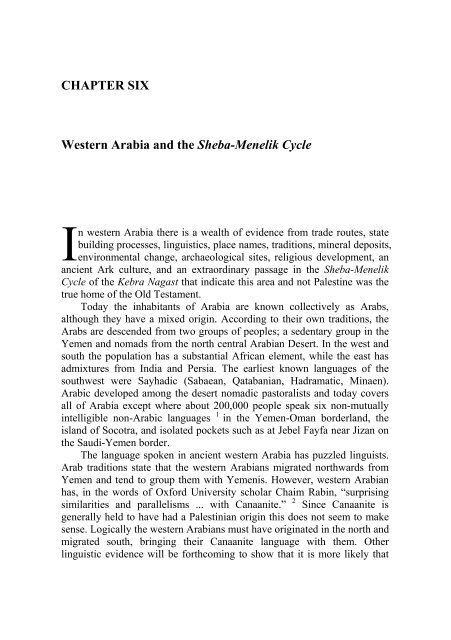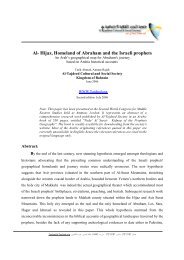Sheba
Sheba
Sheba
Create successful ePaper yourself
Turn your PDF publications into a flip-book with our unique Google optimized e-Paper software.
CHAPTER SIX<br />
Western Arabia and the <strong>Sheba</strong>-Menelik Cycle<br />
I<br />
n western Arabia there is a wealth of evidence from trade routes, state<br />
building processes, linguistics, place names, traditions, mineral deposits,<br />
environmental change, archaeological sites, religious development, an<br />
ancient Ark culture, and an extraordinary passage in the <strong>Sheba</strong>-Menelik<br />
Cycle of the Kebra Nagast that indicate this area and not Palestine was the<br />
true home of the Old Testament.<br />
Today the inhabitants of Arabia are known collectively as Arabs,<br />
although they have a mixed origin. According to their own traditions, the<br />
Arabs are descended from two groups of peoples; a sedentary group in the<br />
Yemen and nomads from the north central Arabian Desert. In the west and<br />
south the population has a substantial African element, while the east has<br />
admixtures from India and Persia. The earliest known languages of the<br />
southwest were Sayhadic (Sabaean, Qatabanian, Hadramatic, Minaen).<br />
Arabic developed among the desert nomadic pastoralists and today covers<br />
all of Arabia except where about 200,000 people speak six non-mutually<br />
intelligible non-Arabic languages 1 in the Yemen-Oman borderland, the<br />
island of Socotra, and isolated pockets such as at Jebel Fayfa near Jizan on<br />
the Saudi-Yemen border.<br />
The language spoken in ancient western Arabia has puzzled linguists.<br />
Arab traditions state that the western Arabians migrated northwards from<br />
Yemen and tend to group them with Yemenis. However, western Arabian<br />
has, in the words of Oxford University scholar Chaim Rabin, “surprising<br />
similarities and parallelisms ... with Canaanite.” 2 Since Canaanite is<br />
generally held to have had a Palestinian origin this does not seem to make<br />
sense. Logically the western Arabians must have originated in the north and<br />
migrated south, bringing their Canaanite language with them. Other<br />
linguistic evidence will be forthcoming to show that it is more likely that




